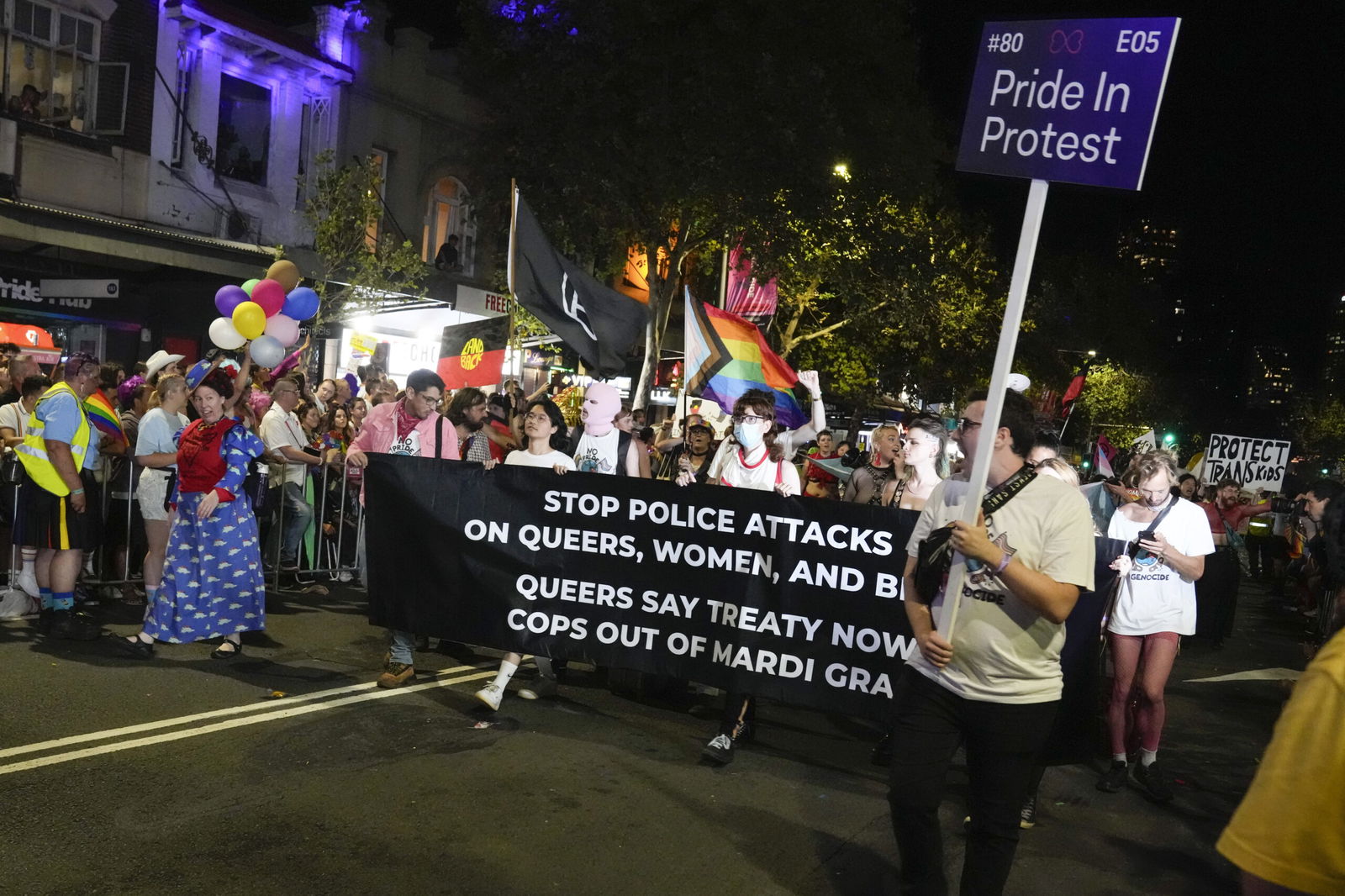Around the World briefs

By Associated Press
Police will be allowed to march in Sydney’s Gay and Lesbian Mardis Gras, but not in uniform
MELBOURNE, Australia | Sydney Gay and Lesbian Mardi Gras organizers agreed Wednesday to relax their ban on police marching in their annual parade with a compromise condition that officers do not wear uniforms.
The decision comes a day after Australian police found the bodies of a couple allegedly shot and killed by an ex-boyfriend, who happened to be a police officer, after he admitted to killing them and hiding their bodies under rocks and debris on a rural property.
On Monday, the board of one of the world’s largest gay pride celebrations asked police not to attend after Senior Constable Beau Lamarre-Condon, 28, was charged with murder in the shooting of his ex-boyfriend and former television reporter Jesse Baird, 26; and Baird’s partner, flight attendant Luke Davies, 29. The couple was killed Feb. 19 in Baird’s home in Sydney. Lamarre-Condon, who briefly dated Baird until late 2023, was arrested Friday.
New South Wales Police Force Commissioner Karen Webb had protested against police being excluded from the March 2 parade, arguing that the homicide was an alleged “crime of passion” rather than the result of “gay hate.”
Webb and the board announced the compromise Wednesday against a background of public anger.
“Police have agreed not to march in uniform, in consideration of current sensitivities,” Webb said in a statement. “I am delighted that our LGBTQIA+ officers, as well as our other police who are allies and supporters, will be allowed to march this year as they have done for the past 20 years.”
The Mardi Gras board added in their statement that police would participate in a “reduced capacity to the originally-planned NSW Police float.” The board did not elaborate on that reduction.
Lamarre-Condon has marched with the police contingent in past parades.
Sydney Gay and Lesbian Mardi Gras began in 1978 as a street protest against discrimination that was brutally broken up by police. Police participation since then has always been divisive, but uniformed police officers have been marching since 1998 as a gesture of respect and support.
Rights campaigner Charlie Murphy described police marching Saturday as “salt on open wounds.”
Australian Federal Police officers have decided not to march, abandoning plans to join their New South Wales state police counterparts.
“This decision was not taken lightly, but we acknowledge how some in the community are feeling about the blue uniform,” a federal police statement said.
Barbuda residents win appeal to protect land from development in potential precedent for Caribbean
SAN JUAN, Puerto Rico | A top court in London ruled Tuesday that two residents of the tiny Caribbean island of Barbuda have the right to challenge construction of an airstrip that critics say endangers fragile ecosystems and was begun without any permits.
The ruling by the Privy Council is considered a big win for John Mussington, a marine biologist, and Jacklyn Frank, a retired teacher, who launched a legal fight against the government of the twin-island nation of Antigua and Barbuda in July 2018.
The government of Antigua and Barbuda had argued that Mussington and Frank had no standing to mount a legal fight.
Leslie Thomas, one of the U.K. attorneys representing the Barbudans, said the plaintiffs now plan to ask the government to tear down what has been built. “This is a real David and Goliath battle,” Thomas said. “We’re up for another big fight.”
Mussington said the ruling would have “significant implications for citizens of Antigua and Barbuda who have long been suffering from the lack of transparency and accountability from key institutions and officials charged with implementing the planning laws.”
The ruling also is expected to set a precedent for other Caribbean nations fighting to protect land that wealthy foreign developers seek to develop, especially after investors seize upon economic opportunities following a catastrophe or national disaster.
A spokesperson for the office of Prime Minister Gaston Browne and a representative for the development did not respond to messages seeking comment about the decision.
Sarah O’Malley, an attorney with the U.K.-based nonprofit Global Legal Action Network, which helped attorneys representing the Barbudians, noted that it took nearly a half-dozen years to reach the verdict.
“Environmental activists around the globe are often bogged down with procedural impediments making litigation costly and time-consuming, a subterfuge employed by those destroying the environment for their own profit,” she said. However, O’Malley said the decision would make it easier for “all who seek to protect nature” to legally challenge government actions.
The ruling by the Privy Council allows the two Barbudians to challenge an April 2021 decision by the Court of Appeal of the Eastern Caribbean Supreme Court that found the residents were not allowed to take legal action against the government.
While Antigua and Barbuda obtained its independence from the U.K. in 1981, it remains under a constitutional monarchy with King Charles as its head of state and the Privy Council as its final court of appeal.
One Privy Council judge, David Hope, argued that environmental issues can be raised by someone even if they are not personally affected by a certain action. He gave an example of construction of wind turbines on a route used by an osprey.
“The osprey has no means of taking that step on its own behalf, any more than any other wild creature. If its interests are to be protected, someone has to be allowed to speak on its behalf,” he wrote.
The ongoing airport construction on Barbuda is part of a deal involving the government, the Barbuda Council and PLH (Barbuda) Ltd., established by U.S. billionaire John Paul DeJoria, co-founder of the Paul Mitchell hair products company. Also involved is U.S.-based Discovery Land Co., founded by Michael Meldman of Casamigos Tequila.
The companies plan to build 495 upscale homes, an 18-hole golf course, a beach club and a natural gas storage facility on more than 600 acres (240 hectares) of protected wetland.
The developers began work on the airstrip around September 2017, after the government evacuated the entire island of Barbuda following Hurricane Irma, a Category 5 storm that was the strongest hurricane ever observed in the open Atlantic.
Among those evacuated to Antigua for at least a month was Frank, who on her return to Barbuda wondered about a light flickering in the distance.
“It turns out it was an airport being built without the proper permissions,” she said, adding that the government never consulted residents. “They were breaking their own laws.”
Construction also began without an environmental impact assessment or a license from the Barbuda Council to clear forest, according to Global Legal Action Network. In addition, there were no public meetings notifying anyone of the construction, and an application for a development permit wasn’t submitted until after construction began.
About 400 acres (160 hectares) that is home to the Barbuda fallow deer and red-footed tortoise already have been cleared to build the airport.
Mussington and Frank also have argued the construction could impact the island’s groundwater supply.
The airstrip is largely completed, and government officials have said that “even if the airstrip was built in violation of development control the airstrip could not be ‘unbuilt,’” according to Monday’s ruling.
The Privy Council noted that if a court finds that the government’s Development Control Authority acted outside of its power, “the remedies potentially available would include an order requiring the land be restored to its original state.”
Mussington and Frank celebrated the ruling, but Frank remained cautious. Another lawsuit filed by a fisherman and tour guide against the government of Antigua and Barbuda over construction of two private villas in a national park is pending in court.
“Despite having won, we Barbudans recognize that the fight for our land is not over,” she said. “We plan to continue to keep fighting in order to protect what is ours and preserve it all for our future generations, just as our ancestors have done for us.”
Latvia extends an entry ban on Russian tourists until March 2025 citing Moscow’s war in Ukraine
HELSINKI | Latvia’s government has extended restrictions on the entry of Russian citizens into the Baltic country until next year, citing Moscow’s full-scale invasion of Ukraine which officials say is “still posing a threat to the internal security of Latvia.”
The Cabinet of Prime Minister Evika Siliņa decided Tuesday to lengthen the entry conditions on Russian citizens until March 4, 2025.
Russian citizens will continue to be banned from entering Latvia, a European Union country, for the purposes of tourism and leisure, the government said in a statement.
However, some Russians will be permitted to enter, including those with residence permits valid in Latvia or another EU member state, or Russians whose entry is related to humanitarian considerations like political dissidents.
In September 2022, Poland and the Baltic states — Estonia, Latvia and Lithuania — reached a joint agreement to restrict the numbers of Russian citizens coming to their countries to prevent alleged security risks amid Russia’s war in nearby Ukraine.
NATO member Latvia, a country of 1.9 million people that borders Russia, is home to a sizable ethnic Russian minority that makes up about 25% of the country’s population. The Baltic Sea nation previously has been a popular vacation venue and its capital, Riga, a popular weekend destination for Russian tourists.
UN hands over 1st military base in Congo to begin its drawdown after decades in the country
KAMANYOLA, Congo | United Nations peacekeepers handed over their first military base to security forces in eastern Congo on Wednesday as part of an eventual withdrawal after decades of operating in the country. The handover comes as violence soars in the conflict-riddled region.
Peacekeepers transferred responsibility and equipment at its base in Kamanyola in South Kivu province to Congo’s national police as part of a phased drawdown agreed upon between the government and the U.N. last year.
Eastern Congo has long been overrun by dozens of armed groups seeking a share of the region’s gold and other resources. The U.N. has been operating in the country for 25 years with its primary mission being the protection of civilians. But frustrated Congolese say that no one is protecting them from rebel attacks, leading to protests against the U.N. mission and others that have at times turned deadly.
Last year, the U.N. Security Council extended the peacekeeping mandate until Dec. 20 and decided that its troop ceiling until June 30 should be 13,500 military personnel, 660 military observers and staff officers, and 2,001 international police. It ordered a reduction from July to 11,500 military personnel, 600 military observers and staff officers and 1,713 international police.
The mission is expected to close 14 bases and facilities in South Kivu by June, at which point the U.N. Security Council will decide on a timeline for the rest of the withdrawal.
The drawdown comes amid soaring violence in recent weeks as one of the most active rebel groups, M23, launched attacks against a community considered the last line of defense before the region’s largest city of Goma.
The M23, with alleged ties to Rwanda, had been dormant for nearly a decade but resurfaced more than two years ago. Its fighters are accused of seizing swaths of land, forcing thousands of people to flee and causing a dire humanitarian crisis.
The U.N. says it’s been supporting Congo’s army by defending positions that are protecting civilians, which remain intact despite coming under fire.
Speaking at the ceremony on Wednesday, U.N. mission chief Bintou Keita said she hoped the handover was the start of a peaceful withdrawal process.
“We hope that the handover of Kamanyola … will serve as a model and inspiration for the rest of (the peacekeepers’) disengagement process,” she said.
But there were mixed emotions among the population Wednesday as the base was handed over. Some praised the mission for its peace-building work. The U.N. “has contributed a great deal,” said Gloire Bahati. “I can imagine that without it, we would all be trampled underfoot by our enemies.”
Others said it was time for Congo’s security forces to protect the country, noting that decades of foreign involvement had yielded little.
“When (the UN) arrived, we thought we would see a serious crackdown on insecurity,” said Ushindi Kulimushi, a resident of the town. “But unfortunately, we have experienced the same thing up to the present day. Let (them) go, because it has failed in its mission,” he said.
—From AP reports



